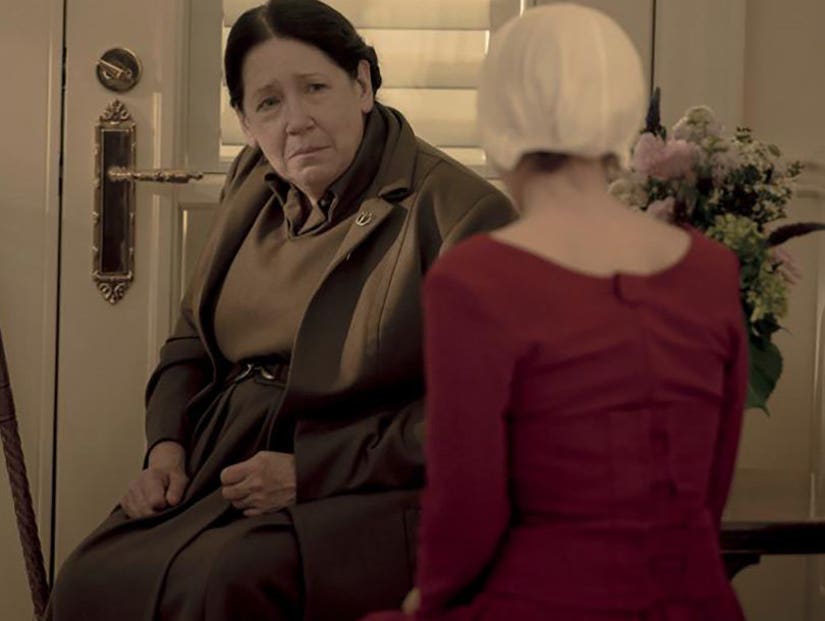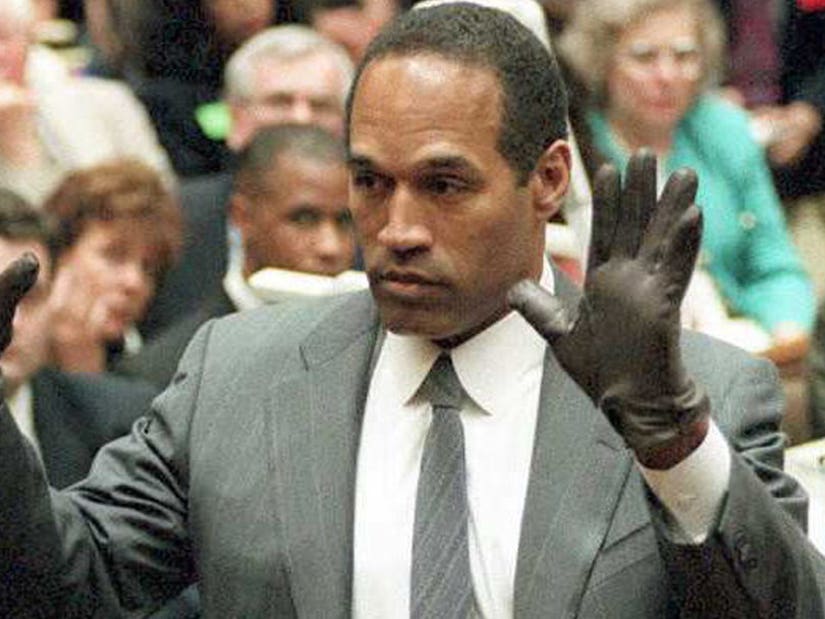A day of ceremony proves a day of opportunity for June as she stands up to Aunt Lydia and begins to lay the foundation for her revolutionaries.
While there was still one savage moment of violence, this latest installment of "The Handmaid's Tale" was one filled with hope and optimism for a future out of the darkness.
There's still a long way to go, and the situation in Gilead is as bleak as ever, but it no longer feels utterly hopeless. And this is because June, empowered by the lessons of Commander Joseph, has taken some agency over her own life, such as she can.
 Instagram
Instagram
Kylie Jenner Destroyed on Twitter for Throwing 'Handmaid's Tale'-Themed Birthday Party
View StoryWe've been waiting two years now for June to stop railing at the system so pointlessly an ineffectively, and finally she has learned the art of subterfuge, subtlety and negotiation. Finally, she is ready to step up as a leader and find a way to do something about this situation.
It's not always enough to blindly want to save her daughter if your tactic is to just go to the house she lives in with no plan and no weapon and think you're going to somehow save her. June always had the will, but now she's showing she has the brains and the knack, too, and "The Handmaid's Tale" is so much better for it.
It was effective in the first season to show just how bad this world was, but it started to get redundant by the second. Every glimmer of hope we got was dashed almost immediately and it was always a hard reset for June back into the Waterford's home. That creates a bleak tediousness that has made "Handmaid's Tale" one of the most challenging shows on television to watch.
Finally, the writers and creators are ready to have this story go somewhere. It's not interesting to just watch women suffer and see any efforts at overt revolution squashed immediately. It's depressing, and it doesn't progress June's narrative or Gilead's. Instead, it leads to stagnation and frustration.
Of course it shouldn't be easy, but it should be possible or what are we watching here? Is this a story about the power of hope and belief and the strength of the oppressed or is it an exercise in torture porn and misery?
After spending a little too long as the latter, it looks like this show has decided to give the other way a try and it's immediately a better show for it.
 Hulu
Hulu
'The Handmaid's Tale' Season 3 Premiere Tears Down Its Past to Set Up an Uncertain Future
View StoryThe Strength of Tears
Tears can convey so much, and yet mean so many different things. And they were used liberally throughout this episode by women of very different standings.
In Canada, Emily continues to struggle settling into the normalcy of life after spending all that time being tortured and drained in Gilead. It's left her hesitant and withdraw, even with her wife, Sylvia.
And so, it's no wonder that both women are reduced to tears when their child, Oliver, asks if Emily can read his bedtime story. It's a huge gesture for the family and a step toward healing and unity they both need.
And as much as Emily is still haunted and perhaps in some ways feeling unworthy of this domestic bliss, it is telling that she delayed her return to the hotel, choosing instead to stay "a little while longer" with Sylvia on the porch.
Those were tears of relief from both women, beginning to shake of the shackle of Emily's torment and hopefully a step toward rekindling the life they'd always dreamed of sharing together.
Back in Gilead, the tears were far harder to read. The episode closed with footage of Luke participating in a protest, but it was brought by an Eye to the Waterfords. June, after identifying Luke to the Eye, collapsed in tears outside the door. Was it just relief in seeing Nichole with her husband, as she would have wished.
 Getty
Getty
Geoffrey Rush Wins Record $2million in #MeToo Defamation Case
View StoryOr is there perhaps also some fear of what she has set in motion. After all, Gilead sees Nichole as having been kidnapped from the Waterfords and taken to Canada effectively against her will. What measures would they take to bring her back? The nation doesn't seem to have a particularly strong standing in the global eye, or in Canada after their last disastrous trip there, but they might try subterfuge or a covert military operation.
Serena's tears seemed fairly straightforward; a mother happy to see that her child is well. But her relationship with Nichole is also complicated, acknowledging as she did to June last wee that the child is not hers ... at least not really.
Plus, would a newly-woke Serena really want to bring Nichole back to Gilead where she would be subjected to the types of lives offered to women there? Or, as she's done in the past, is the sight of Nichole enough for Serena to backtrack into the clutches of the Gilead system she helped design and -- as evidenced by a brief exchange with June -- she still at least believes in somewhat.
The most inexplicable tears of them all came from a woman who has been the symbol of Gilead from the beginning, brutally enforcing its edicts and seeming to have drunk all of its Kool-Aid. And yet, after June threw herself over Janine to stop a beating, it was Aunt Lydia who retreated, stammering her apologies to the commanders and wives in attendance.
Finding a solitary room, she began to weep. But was she crying because she, too, is slowly awakening to the awfulness of this world or is it more based in self-interest. Lydia has bristled at her station in this world, as she wields considerable power and yet is treated no better than the Marthas or Handmaids by Commanders and their Wives.
After her injury last season, Lydia is not yet at full strength and yet she is resisting with every fiber of her being appearing weak. Perhaps she knows that if she proves she can't hack it as an Aunt, there are far worse positions for her in Gilead, or in the worst case, the Colonies. Perhaps that sense of self-interest could be what convinces her to consider revolution.
Three seasons in, Aunt Lydia remains largely an enigma, and that's thanks to the brilliance of Ann Dowd's continuing performance. And now, we're seeing a whole new side of her, railing against her own frailty and now breaking down altogether. Once again, Down is turning in career work and might just find herself looking at another Emmy nomination ... though she faces stiff competition even from within her own show.
 Getty
Getty
Ariana Grande Donates All Proceeds from Atlanta Concert to Planned Parenthood
View StorySowing the Seeds
Aunt Lydia is a long-shot for sure, but June opened the episode by pointedly wondering who among the people around her are potential candidates for revolution. Her new walking partner, Ofmatthew, appears to be as devoted to Gilead as anyone to the point it almost seems fake, but she has also mothered three children into this world. That's possible leverage.
Fred actually came to June at a loss for what to do in his marriage, and June immediately seized upon an opportunity. When he offered that perhaps Serena isn't satisfied gardening and knitting, June suggested that maybe Serena should be given a voice, "behind the scenes, of course." Gilead, like any governing system, is all about perception, but the reality can be vastly different.
Just as the nation puts on a face to the world that they are not abusing and raping their women, Fred could easily put on the face that he is making all the decisions when actually it's Serena. She was always the smart one anyway; she just happened to be the wrong gender. After all, what's one lie after another?
For June, though, this creates the possibility of an ally to her cause in a position of some influence and power -- unless those images of Nichole just derailed everything. The smoke break the two women shared in the pool house was one of equals and even perhaps a sort of friendship.
That last one is already bearing fruit, as June offered up details of where Hannah goes to school and when June might see her. And this came after June admitted to her that she came back to Gilead for the sole purpose of getting Hannah and getting the hell out of here, an idea Serena is decidedly not shutting down.
June doesn't seem to realize the power and influence she is amassing herself. Aside from Ofmatthew, she already has tremendous power and influence over the other Handmaids because of what she's done, she practically has Fred eating out of her hands and she's building a genuine bond with Serena. On top of that, Joseph has taken an interest in her, though his motives remain somewhat murky.
As Joseph had encouraged, June is using her brain far more than she has in the past, strategically building alliances as needed while staying true to her subservient role. The only nut she can't seem to crack at all is Aunt Lydia ... and that's a nut no one has cracked just yet. Can we get a flashback episode, please!
 Getty
Getty
Hollywood Stars Outraged After Alabama Senate Passes Near-Total Abortion Ban
View StoryThe Power of Ceremony
The framing sequence for the hour is the Christening of Hannah when she was a baby, which her family take to with varying degrees of skepticism. But it's the power of the ceremony itself that matters, and that allegory carries throughout.
The entire episode takes place on one day in Gilead, a day of ceremony and celebration for all the babies that had been born that year. The Wives are honored and even the Handmaids who bore the children are given preferential treatment. It's all ceremony and for show, and there's a power in that because who really looks beneath the ceremony.
June has little trouble moving around and making her connections with Fred and Serena and even the other Handmaids during the various parts of the day because there are expectations of what she should be doing and where she should be at any given time. So, as long as she is where she's supposed to be and appears to be doing what she's supposed to be doing, she has a tremendous amount of freedom because people get complacent and don't always pay attention.
Joseph, in his way, taught her the power of working beneath the ceremony toward her own ends. Her selection of the women to save last week was all part of the ceremony of Gilead, but the selections themselves were designed to serve the coming revolution. Even Joseph's house follows all the visible rule of Gilead, and yet look what dissension lurks within those walls.
In many ways, powerful and strong ceremony can serve as misdirection much as a magican uses the flourish of their hands to turn the eye away from what they're really doing. In this way, they create an effective surprise moment we take as magic. But it's just that we were looking at the wrong thing and missed the trick they were pulling right before our very eyes.
We can get distracted by the ceremony. The more structured and grand and rigid it is, the bigger the distraction, and Gilead takes the ceremony of Catholicism and makes it look like reckless abandon. It may look like the strength of Gilead, but as June learned throughout this day of ceremony, it could also be one of its greatest weaknesses.
Ceremony brings people together and June is becoming quite adept at taking advantage of every opportunity that affords her. The revolution is under way, it is under the ceremony and it will be as shocking to the commanders and their wives as it was when Aunt Lydia's savage beating of Lydia interrupted their dinner party.
New episodes of "The Handmaid's Tale" drop every Wednesday on Hulu.
Got a story or a tip for us? Email TooFab editors at tips@toofab.com.






















